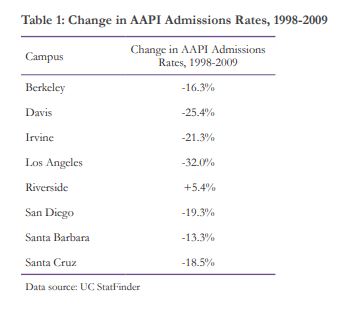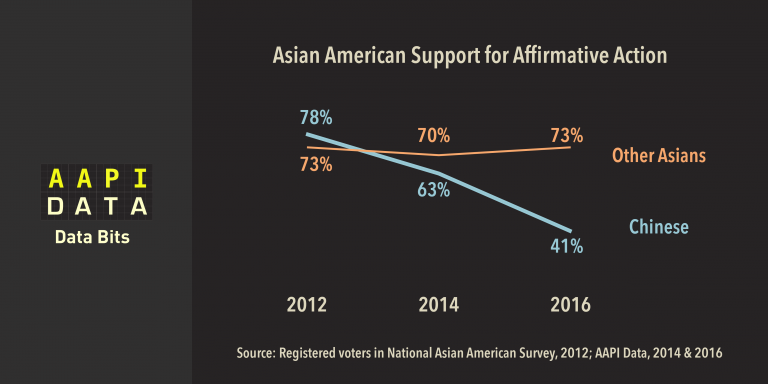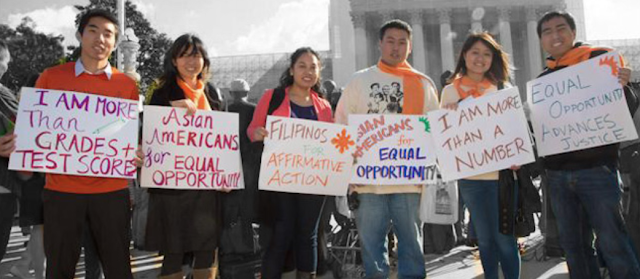By Angela Yip
My senior year of high school, I debated a pending Supreme Court case, Fisher v. University of Texas, which questioned the use of affirmative action in college admissions. I was assigned to argue on the side of Abigail Fisher, a White applicant with just below average grades compared to admitted freshmen. Fisher argued that she was denied admission because of the university’s consideration of race in its admissions process. Students in my class shared their thoughts after the debate and decidedly voted I had won. Internally, I was baffled and fuming.
Growing up in the Bay Area, I experienced discrimination and witnessed the effects of generations of inequality everywhere I looked. I held my chin up when taunted with mocking accents, when asked whether I ate dogs, and when a classmate protested being seated next to “too many Asians” due to his ‘w’ first-initial last name. I watched my grandma hobble onto crowded buses which rarely came. During the recession, I looked on as minority business owners, as hard as they worked, closed their doors at disproportionately high rates. My parents taught me I should always stand up for justice and what is right.
The arguments shared in favor of Fisher were all too similar to those used to insist that race and gender don’t matter–that hard work is the only ingredient needed to achieve your dreams. We all want to live in a world in which, with hard work, everyone has a fair shot to succeed. But we cannot ignore that race and gender inequalities run deep.
Thankfully, in 2013 the Supreme Court ruled in Fisher v. University of Texas, as they have again and again, that affirmative action is constitutional. This year, affirmative action in college admissions is front and center again due to Proposition 16, a California ballot measure which would reverse the state’s ban on the use of affirmative action in public higher education, public employment, and government contracting.
Driven by ideals of justice and fairness and often pulling from painful experiences of hate and discrimination, vocal opponents of affirmative action and Proposition 16 in the Asian American community fear that race-conscious admissions will result in an “Asian American penalty.” They have stated that Asian American admissions at the UC will be cut in half, will be capped, or will require higher test scores if Prop 16 passes. I have seen these fears spread like wildfire on group chats and social media threads and among family and friends. The good news is these fears do not hold up to fact.

Immediately following the implementation of the state’s ban on affirmative action, Asian American and Pacific Islander admission rates actually dropped at 5 out of the 8 UC campuses. Ten years into the ban on affirmative action, AAPI admissions rates had decreased significantly at all UC campuses, with the exception of UC Riverside. Black, Latinx, and Native American admission rates decreased significantly across the UC system when race-conscious admissions were eliminated.

Prop 209, which banned affirmative action in 1998, was marketed as the “California Civil Rights Initiative” and claimed to eliminate discrimination against individuals on the basis of race, sex, color, ethnicity, and national origin. But this measure was grossly misnamed. Prop 209 did not grant any legal protections that were not already in place. In fact, it was supported by anti-civil rights groups and figures–including the White supremacist former leader of the Klu Klux Klan–who knew that its passage would decrease educational and economic opportunity for historically marginalized groups.
The truth is affirmative action has historically benefitted Asian Americans and is an important tool to address inequities within our communities. Asian Americans, as a result experiencing both different histories and stereotypes, experience a wide range of outcomes when it comes to education and economic opportunity. For example, fewer than 15 percent of Cambodian, Hmong, and Laotian Americans have a bachelor’s degree, compared to 28.5 percent of all Americans. Educational disparities across groups exist even among those of the same income level.
Prop 16 will not create a quota system and will not give racial preferences in college admissions. In fact, race- and gender-based quota systems in admissions were ruled unconstitutional by the United States Supreme Court, and the University of California Regents, who support Prop 16, have already ruled that they will not allow quotas to be used in UC admissions.
Prop 16 simply allows colleges and universities to evaluate race and gender as one piece of a holistic review process–without changing the standards for anyone–and enables schools to recognize race and gender diversity as adding value to all students’ educational experience.
Prop 16 allows government agencies to consider race and gender when hiring and contracting, so that women- and minority-owned businesses can reclaim $1 billion in government contracts that they are currently losing out on each year.

Affirmative action was designed to level a playing field carved by institutional racism and sexism. It recognizes the economic disparities and historical discrimination that have impacted opportunity for Black, Latinx, Indigenous, Asian American, and Pacific Islander folks and women. It allows universities to create targeted programs to increase transfer and graduation rates, establish women in stem mentorship programs, and recruit highly qualified minority applicants for teaching and medical programs, so that we have teachers and doctors who look like the communities they serve. That is why, when polled, 70% of Asian Americans support the use of affirmative action in college admissions, and over 100 major Asian American organizations have endorsed Prop 16.
It has never been clearer that we live in a deeply unequal society. As Asian Americans, our belonging in the US has always been conditional. Deemed model minorities one minute and bat-eating disease bringers the next, Asian Americans have been praised, assaulted, deported, detained, and barred from entering the country depending on the national mood. Prop 209 strengthened institutional racism against all people of color by ensuring that our backgrounds and the struggles we have endured are erased.
This November, Californians have an opportunity to give some power back to our communities. Proposition 16 will give us a tool to root out discrimination by ending the state’s ban on affirmative action.
As Asian Americans, we have got to care not only for ourselves, but for others and realize that our struggles are linked by a system of White supremacy, a system built to continuously diminish the power of minority groups. Prop 16 is how we meet the current moment.
Now is the time to fight for what we believe in. Prop 16 is how we build a California that reflects our values of diversity and fairness for all.
_____
(About the author: Angela Yip (she/her) is the Director of Social Justice at AAMPLIFY, a nonprofit organization working to empower leadership and build college opportunity among Asian American students in the Bay Area. She studied Political Science and Asian American Studies at UCLA.)


